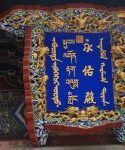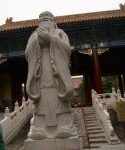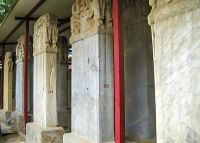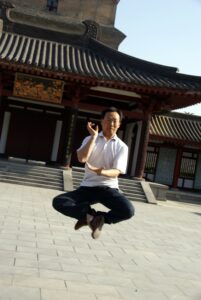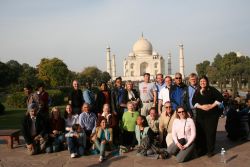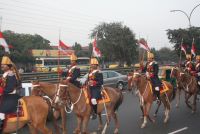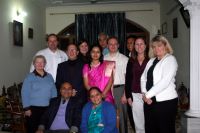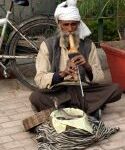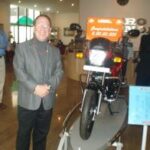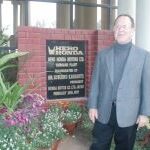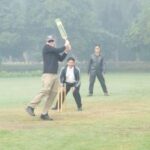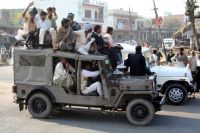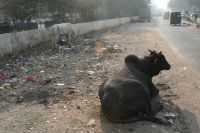We’re about to leave mainland China, having spent the last few days as  tourists. In Shanghai, we spent a day in a “water town,” one of the cities on the Grand Canal that has been gentrified for tourists–and was mobbed with them. What was pretty neat was that we visited the home of one of the country gentlemen, and once again realized that “to be rich is glorious,” Deng Xiao ping’s comment.
tourists. In Shanghai, we spent a day in a “water town,” one of the cities on the Grand Canal that has been gentrified for tourists–and was mobbed with them. What was pretty neat was that we visited the home of one of the country gentlemen, and once again realized that “to be rich is glorious,” Deng Xiao ping’s comment.
The next day (our last in Shanghai) we visited (along with half the world) the Oriental Pearl Tower, the highest TV tower in Asia. It gave us a view of Pudong and the Bund. As far as the eye can see, Shanghai is high rises. The building also houses a Shanghai museum, which had models of the International Settlement from the 1920s, which look like some of my postcards–and dioramas of the major buildings left from the foreign days. There are more than I thought–and it seems to be that the new emperors in China tend to occupy the buildings and palaces of the old.
That’s true here in Xiamen, perhaps better known in the West as Amoy, which is how it is pronounced (I think) in the local (Hokkien) dialect. It’s at 24 degrees, says my GPS, which makes it somewhere around Mexico, and located along the coast; it’s hot and humid. I hadn’t been here for about 13 years, and so it’s a real litmus test of how far China has changed since I’ve been traveling. The short answer is “a lot,” even in this city of 2 million, which the Chinese call a small city.
It has some really important history:
At the end of the Ming dynasty, the Chinese resistance focused here, on a rebel the Dutch called Koxinga (whose name is Zheng Chenggong). He helped recapture Taiwan (I think) and that makes him important in contemporary China–Amoy is the closest big city to Taiwan, and the Chinese Nationalists on Taiwan occupy a few islands in sight of the city. For years, they shelled one another at regular intervals. Last time I was here we were able to see the nationalist troops and hear slogans and the national anthem. I understand it’s pretty low-key today, but a reminder that the
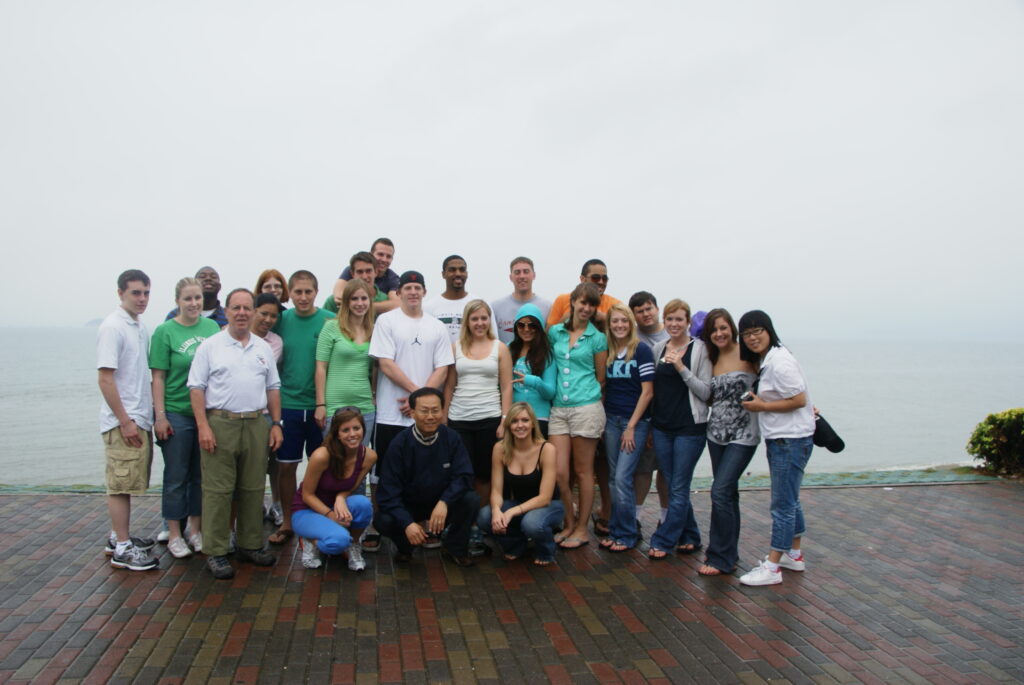
Taiwan Straits is one of the major problems in Sino-foreign relations. The mainland Chinese consider Taiwan part of China, and any efforts to separate are taken very seriously (nationalism is one of the bonds that unifies a disparate China).
In 1860, Amoy became a treaty port–with a difference. It was the only port other than Shanghai that developed an international settlement, where 
 foreigners set up their own government. The settlement was on Drum Wave Island (Gulangyu), and when I first went there in 1993, I was astonished at how much of the old architecture was left. The island has no cars (is this China, I asked?), had
foreigners set up their own government. The settlement was on Drum Wave Island (Gulangyu), and when I first went there in 1993, I was astonished at how much of the old architecture was left. The island has no cars (is this China, I asked?), had 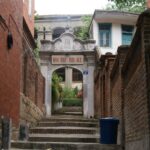
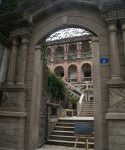 crumbling architecture, and only about 20,000 people. Because of the proximity to Taiwan, Xiamen became a closed city, controlled by the Navy, and with the Navy officers occupying many of the mansions.
crumbling architecture, and only about 20,000 people. Because of the proximity to Taiwan, Xiamen became a closed city, controlled by the Navy, and with the Navy officers occupying many of the mansions.
Happily, much of the architecture is restored and preserved; it’s ironic to me that the Chinese now recognize the semicolonial period (how they describe it) as part of their patrimony–and there were incredible crowds on the island (it was Sunday), part of the enrichment going on that makes it possible for Chinese tourists. The part near the jetty has been converted into shops (as has been most of China), but the rear of the island has many of the old mansions restored. Since I was here last, there is a new “piano museum” collecting
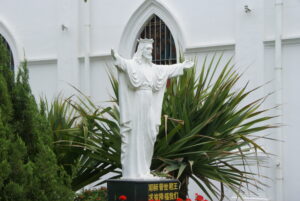
the pianos that were in the foreign houses. There are some incredibly elegant works of art that passed as pianos, and there are recordings that play around the island, which is known as the “piano capital” of China.
Finally, Xiamen was one of the original special economic zones designated in the ’80s by Deng Xiao Ping to attract foreign investors with special tax and other privileges. While our guide has pointed out that the zone’s success has varied depending on who the regime in Beijing wants to favor (it was Pudong until recently) we saw lots of factories on our trip to a hot spring (everyone’s favorite visit!) The guide also pointed out that the tensions in Taiwan-mainland relations have scared some foreign investment.
China’s diaspora has come mostly from Amoy and Guangdong, the next province south, so the food has started to resemble more what we see in the United States. Happily, we are in an area where I can walk around (in the center of the city), and we found a restaurant we liked so well (it was a free night) that we took the whole group–spicy squid, goose, various pork dishes (including the best pork chops I’ve ever had)–not the standard tourist stuff we’ve been eating.
Yesterday I got up early and walked to Sun Yat-sen park, which is right around the corner. It makes an epigrammatic statement about China’s 20th and 21st century history. The park was built in the late ’20s in honor of Sun Yat-sen, the founding father of the Chinese republic. A large bronze statue of the Dr. greets you when you enter the park. The introduction talks about the development of the park, which housed a temple, creek, mountains, zoo, and pavilions, trashed during the madness of the Cultural Revolution. Parts have been rebuilt, and the park was full of Chinese doing what Chinese do in the morning–tai qi, tai qi with sword, exercising (there’s a lot of gymnastic equipment for stretching, which has only recently been installed in Bloomington at Tipton Park), dancing, and sitting and enjoying life. A far cry from the ancient regime.
Two quick comments as we prepare to leave for Hong Kong:
There are currents, most of which we do not see, because we’re pampered prisoners, pretty much seeing what they want us to see. The inflation rate is high (as it is elsewhere in the world) for food, and the general rate here is about 8%, but higher in many basics. The Chinese government in Xiamen has ordered the buses not to use air conditioning to save on fuel, which is pretty enlightened, and has pushed back the development of ethanol to put an emphasis on food.
Second, the concept of the two Chinas is valid even in small cities like Xiamen. The main street (named for Dr. Sun, and one named abolish the foreign dynasty the Qing and restore the Ming) look for all the world like Michigan Avenue. The other China is the countryside, and the neighborhoods around the corner from Michigan Avenue. No doubt, China is raising living standards. Those left behind may be making history in the future–as they have in every Chinese dynastic cycle. More from Hong Kong.
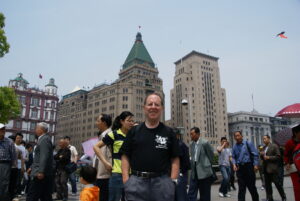
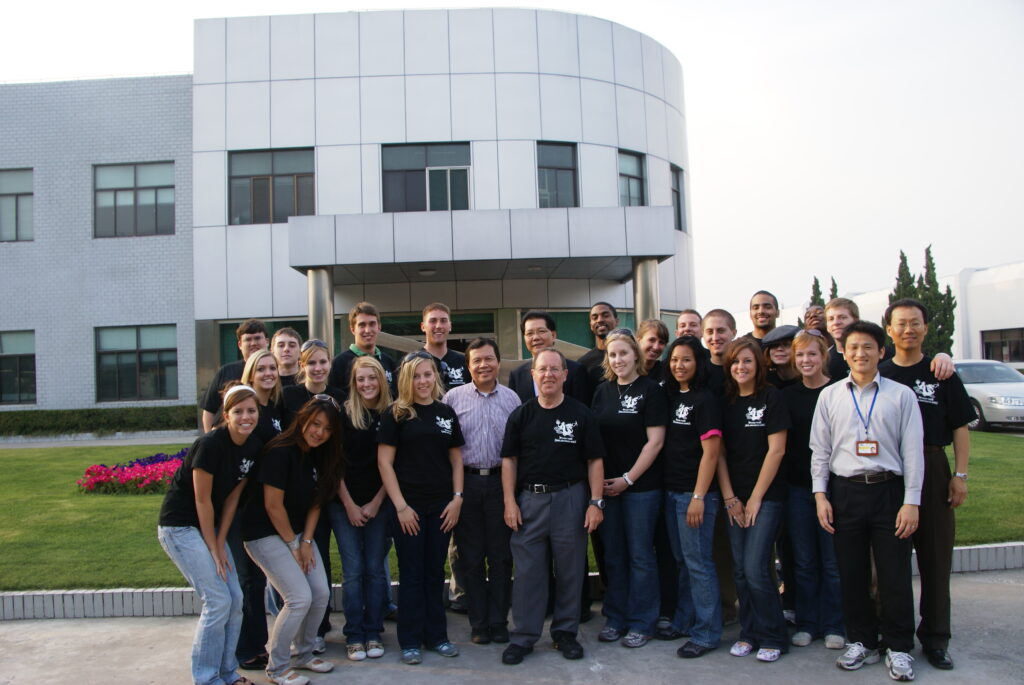
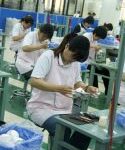

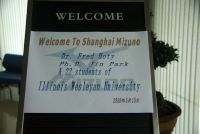


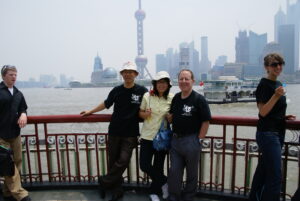
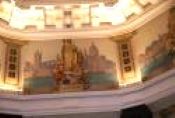


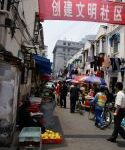
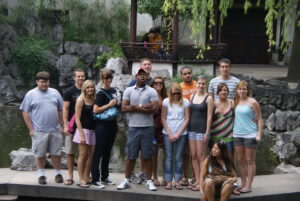 Chinese city at least for a hundred years (and I have the postcards in my collection to prove it). Now surrounded by the “City God Mall,” the Garden was an estate of a Ming dynasty official (built for his parents–recommended as a gift from the class to their teachers), who had both money and taste. It had its own opera house, rocks brought in with wondrous shapes from Tai Lake, mahogany furniture (that frankly looked uncomfortable, but we weren’t allowed to sit in it anyway), and the ponds and hills that combined make up the word for scenery in Chinese. Even with the crowds, and even surrounded by 15 million Shanghainese, it provides the serenity that the rich could afford.
Chinese city at least for a hundred years (and I have the postcards in my collection to prove it). Now surrounded by the “City God Mall,” the Garden was an estate of a Ming dynasty official (built for his parents–recommended as a gift from the class to their teachers), who had both money and taste. It had its own opera house, rocks brought in with wondrous shapes from Tai Lake, mahogany furniture (that frankly looked uncomfortable, but we weren’t allowed to sit in it anyway), and the ponds and hills that combined make up the word for scenery in Chinese. Even with the crowds, and even surrounded by 15 million Shanghainese, it provides the serenity that the rich could afford.
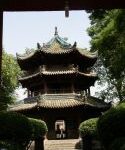
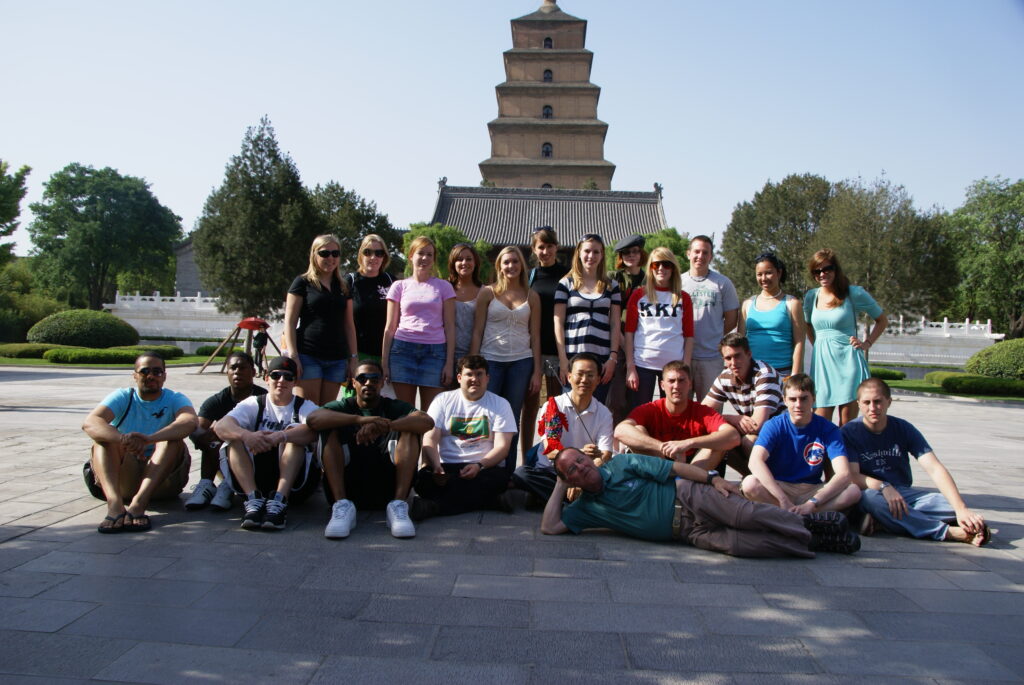
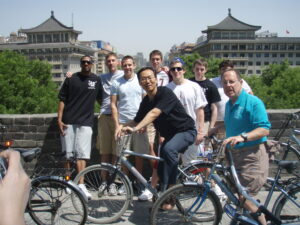 had not been given permission to go back inside. And it stayed that way for at least an hour. The news here has been filled with information about the damage, and China’s response. Contrast the government’s acceptance of aid, fast moving, sending of the army, etc. with the response of the junta in Myanmar, and I think you’ll understand how far China has come in becoming a responsible member of the world community. In 1976, an earthquake in Tangshan resulted in 100,000 deaths in five minutes, and China responded to efforts to help the way the Burmese generals did. It was an unsettling minute, and we had a lot of inquiries from worried parents and a worried University.
had not been given permission to go back inside. And it stayed that way for at least an hour. The news here has been filled with information about the damage, and China’s response. Contrast the government’s acceptance of aid, fast moving, sending of the army, etc. with the response of the junta in Myanmar, and I think you’ll understand how far China has come in becoming a responsible member of the world community. In 1976, an earthquake in Tangshan resulted in 100,000 deaths in five minutes, and China responded to efforts to help the way the Burmese generals did. It was an unsettling minute, and we had a lot of inquiries from worried parents and a worried University.
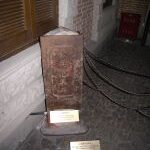
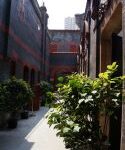
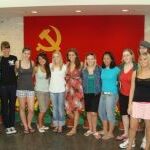
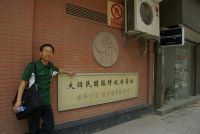
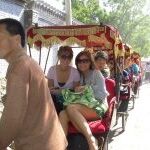

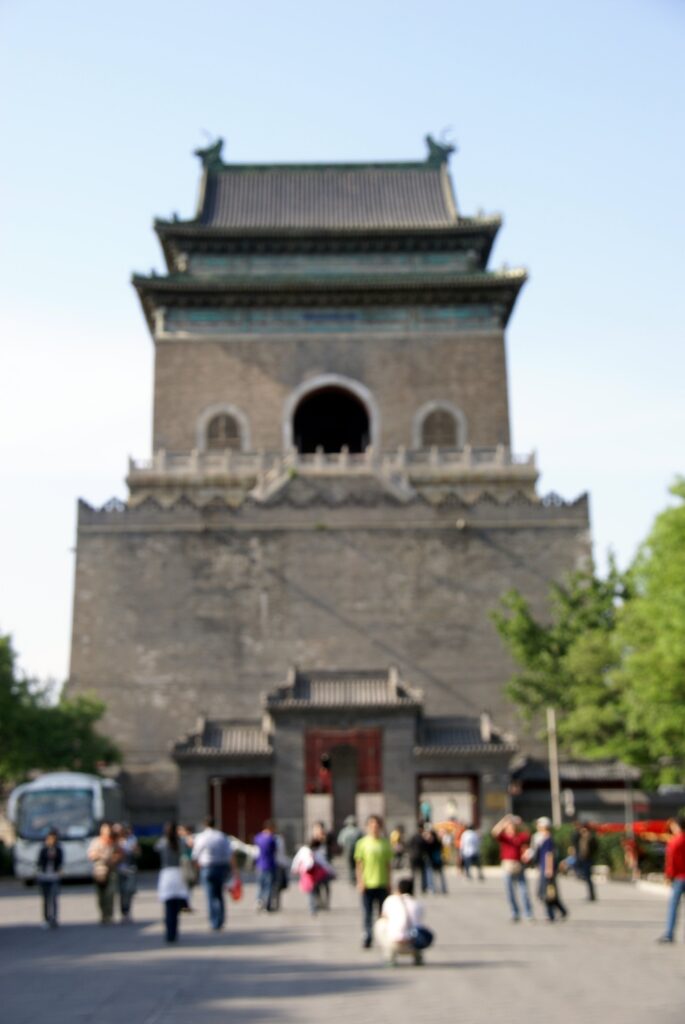


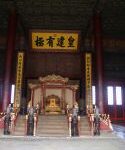
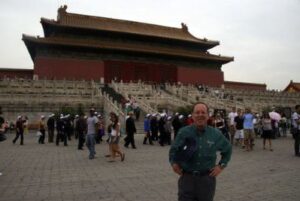
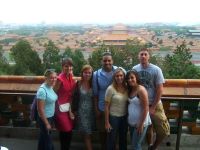
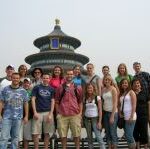

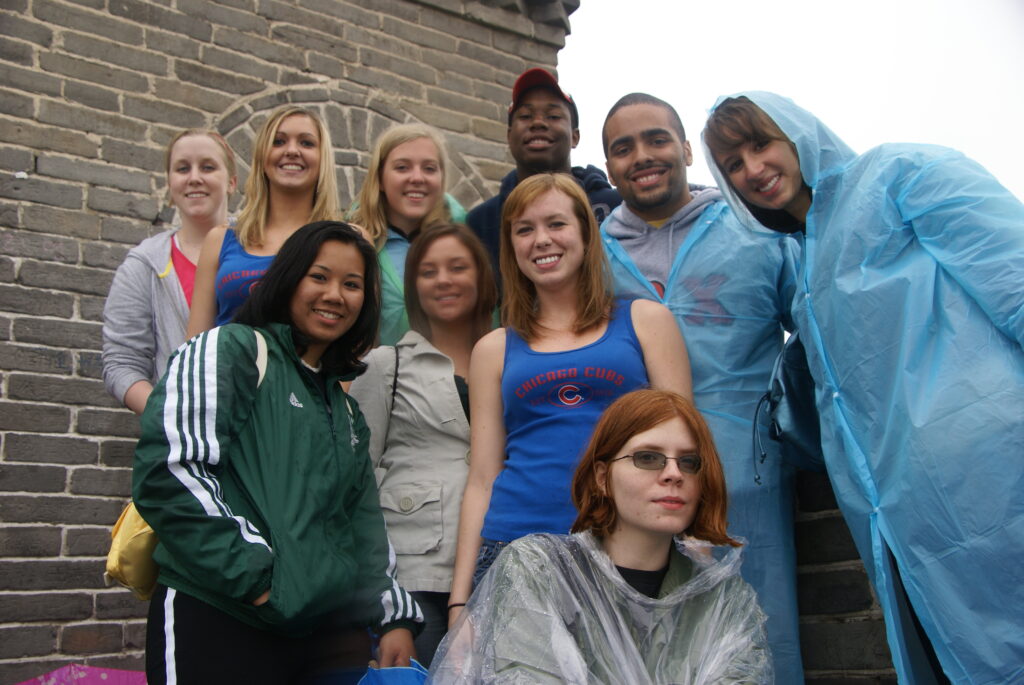
 Beijing is getting ready for the Olympics, and perhaps the best example I can give you of the face lifting (and of the changes from when I first came in 1990) is the airport. When I came in 90, I still remember the two lane road. You can still see it from the 8 lane expressway! We got stuck behind a horse cart. And the terminal was probably vintage 1940. It was so old they said it was when I was your age.
Beijing is getting ready for the Olympics, and perhaps the best example I can give you of the face lifting (and of the changes from when I first came in 1990) is the airport. When I came in 90, I still remember the two lane road. You can still see it from the 8 lane expressway! We got stuck behind a horse cart. And the terminal was probably vintage 1940. It was so old they said it was when I was your age.
